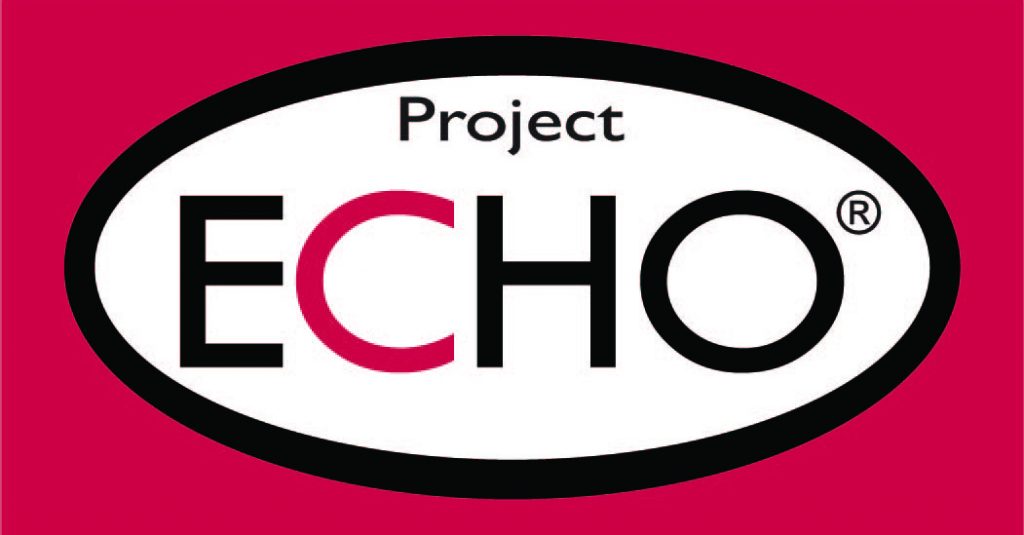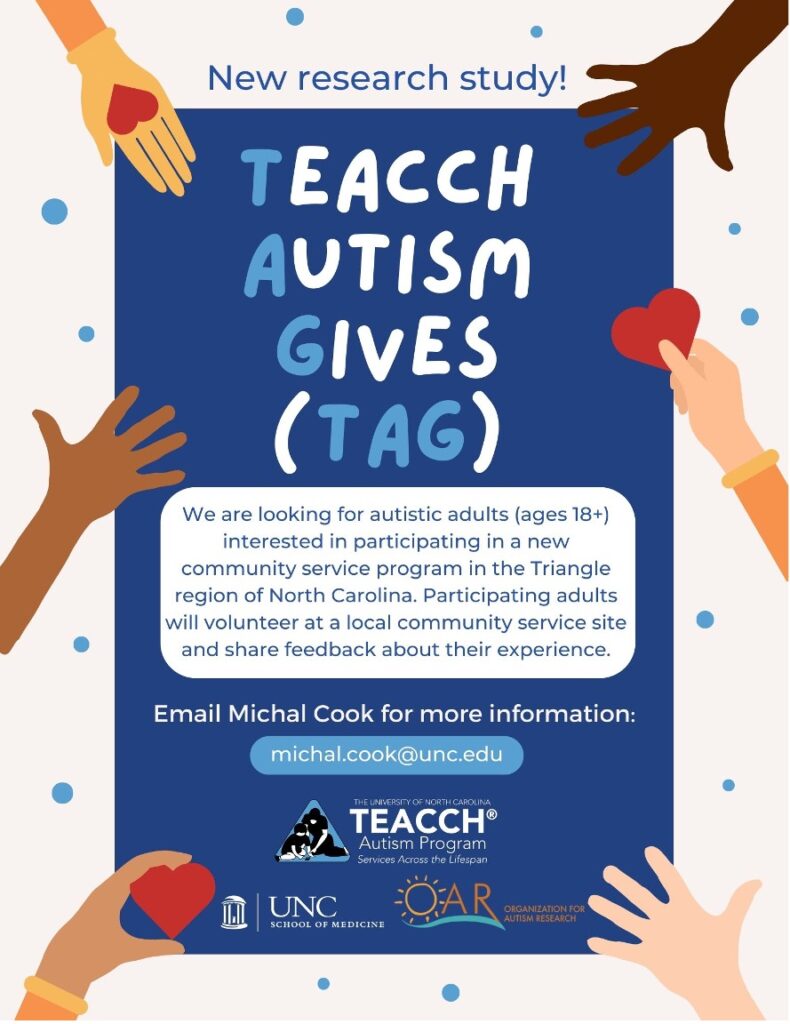Research

Our research focuses on community dissemination and implementation of the intervention and professional development programs dedicated to improving the quality of life for autistic individuals. Our research team is composed of an interdisciplinary group of researchers (faculty, postdoctoral fellows, clinical psychology interns, and clinical psychology graduate students) from the School of Medicine and the Department of Psychology and Neurosciences.
TEACCH School Transition to Employment and Post Secondary Education Program

The TEACCH® School Transition to Employment and Postsecondary Education Program (T-STEP) is a community college-based intervention developed to support the transition to employment and post-secondary education for 16 to 21-year-old autistic individuals who will or have received the Future-Ready Core high school diploma. The T-STEP is a 12-week intervention that includes a didactic course on the community college campus targeting executive function, emotion regulation, and social communication skills. Additionally, students practice these skills every week at a volunteer internship site. Students also receive individual career counseling, higher education counseling, and self-advocacy counseling.
We are conducting a federally-funded randomized controlled trial to assess the efficacy of the T-STEP program. This project (funded by the Department of Defense) compares the efficacy of the comprehensive T-STEP program (course, internship, and counseling) to a less intensive program including services typically available on a college campus. This is a 4-year study with 120 participants. This research study is currently recruiting for Fall 2022 T-STEP in person at Alamance Community College and in person at Wake Tech Community College. View Flyer here
For more information, contact the TSTEP team at 919-966-4684 or TEACCH_Research@med.unc.edu
Autistic Adults and other Stakeholders Engage Together – Suicide Prevention
 The Autistic Adults and other Stakeholders Engage Together – Suicide Prevention (AASET-SP) research team aims to compare the helpfulness of two suicide prevention strategies tailored for autistic individuals: the Safety Planning Intervention tailored for Autistic individuals (SPI-A) and SPI-A plus structured follow-up care (SPI-A+). This team includes autism and suicide prevention researchers, clinicians, as well as autistic individuals and their families. This work is supported through a Patient-Centered Outcomes Research Institute (PCORI) Project Program Award (SP-2020C3-20951).
The Autistic Adults and other Stakeholders Engage Together – Suicide Prevention (AASET-SP) research team aims to compare the helpfulness of two suicide prevention strategies tailored for autistic individuals: the Safety Planning Intervention tailored for Autistic individuals (SPI-A) and SPI-A plus structured follow-up care (SPI-A+). This team includes autism and suicide prevention researchers, clinicians, as well as autistic individuals and their families. This work is supported through a Patient-Centered Outcomes Research Institute (PCORI) Project Program Award (SP-2020C3-20951).
Long-term Adult Outcomes
We are following a group of 300 30 to 50-year-old autistic adults who were seen at TEACCH as children. We are looking at developmental trajectories across the lifespan and are also looking at the needs of autistic adults with ASD. We are currently recontacting families to (1) examine employment and residential status for 30-60-year-old adults; (2) identify predictors of adult outcome (employment and residential status) across a 5-year time period, and pilot a caregiver survey assessing cognitive decline/dementia in a subset of this population to examine aging with autism. We are also studying community integration through the use of GPS trackers.
Second Generation Study
Project ECHO Autism

Through ongoing funding from the NC Council on Developmental Disabilities (NCCDD), the North Carolina Department of Health and Human Services (DHHS), and the NC Area Health Education Centers (AHEC), TEACCH is implementing and collecting data on a teleconsultation model (Project ECHO) to support primary care medical and mental health providers in rural North Carolina. Our goal is to improve healthcare for autistic individuals across the lifespan. To date, we have reached 92 providers in 20 counties. We are currently conducting a follow-up study of the first 5 cohorts of providers and recruiting for two additional cohorts. Learn More
TEACCH Autism Gives (TAG)
 We know that community participation is an important part of the quality of life in adulthood, but that many autistic adults lack community participation opportunities. Volunteer work or community service is one form of community participation that has been shown to improve mental and physical health, social connection, employment readiness, and quality of life in the general population. We want to know if participation in these kinds of volunteer activities could meaningfully impact the quality of life for autistic adults as well.
We know that community participation is an important part of the quality of life in adulthood, but that many autistic adults lack community participation opportunities. Volunteer work or community service is one form of community participation that has been shown to improve mental and physical health, social connection, employment readiness, and quality of life in the general population. We want to know if participation in these kinds of volunteer activities could meaningfully impact the quality of life for autistic adults as well.
To study this, TEACCH is creating a new volunteer program. Our study has 2 parts that you may be interested in:
1) We are looking for autistic adults (ages 18+) to participate in a 1-hour Zoom interview to share their experiences in the community and provide feedback on our plans for the program. These adults will be given a $30 gift card for their time and contribution.
2) We are looking for autistic adults (ages 18+) to participate in the volunteer program! Volunteers will be matched with a local community service organization to complete weekly volunteer hours. They will also attend pre and post program visits before and after their volunteer experience, during which they will be asked to complete some questionnaires and share feedback.
If you are interested in participating in either or both of these research opportunities, please contact the principal investigator, Ms. Michal Cook, at michal.cook@unc.edu for more information.
For more information regarding UNC TEACCH Autism Program Research, please contact Elena Lamarche at elena_lamarche@med.unc.edu
